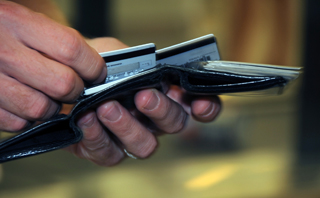PUC’s invitation reads like PG&E’s language
by Jaxon Van Derbeken, San Francisco Chronicle

PG&E organized a gas safety conference last year to be held under the banner of the CPUC. Documents provide the best evidence yet of an overly cozy relationship between PG&E and the CPUC, which will decide within the next two months whether to fine the company as much as $2.5 billion for the September 2010 gas-pipeline explosion that killed eight people in San Bruno. San Bruno City Manager Connie Jackson said the e-mails were “more than shocking. … They show PG&E and not the PUC was the mastermind behind this symposium.” Read More ›
Insurance mandates for Uber inch ahead in Legislature
by Cheryl Miller, The Recorder (San Francisco)

AB 2293 would require ride-share drivers to carry insurance providing $750,000 in coverage when they’re waiting to be matched with a passenger. The Senate Appropriations Committee said it would drop that to $300,000. But it also said it would force transportation network companies to provide $1 million in liability coverage to cover damages above a driver’s limits. The state Public Utilities Commission is weighing its own insurance requirements for TNCs. A hearing on the issue scheduled for Thursday was delayed until Aug. 28. Read More ›
As data overflows online, researchers grapple with ethics
by Vindu Goel, The New York Times

Facebook manipulated the news feeds of nearly 700,000 people to learn how the changes affected their emotions. When the research was published, the outrage was immediate. Now university and corporate researchers are grappling with how to create ethical guidelines for this kind of research. “Consumers should be in the driver’s seat when it comes to their data,” said Edith Ramirez, chairwoman of the Federal Trade Commission, which regulates on issues like privacy and the Internet. “They don’t want to be left in the dark and they don’t want to be surprised at how it’s used.” Read More ›
Automotive safety agency slow to open investigations
by The Associated Press, San Francisco Chronicle

The Associated Press reviewed all 15 petitions filed by drivers with the National Highway Traffic Safety Administration since 2010 and found the agency missed the legal deadline to grant or deny the requests 12 times. The agency has been criticized for failing to connect the dots among thousands of consumer complaints it received last decade about small GM cars with defective ignition switches. GM finally recalled the cars this year. The faulty switches have been linked to at least 13 deaths. Read More ›
Credit cards from Amazon, Office Depot, Staples, Best Buy, Toys R Us have highest APRs
by Chris Morran, Consumerist

The average APR on credit cards from America’s largest retailers has climbed more than 2 percentage points to 23.23 percent. High rates make a difference. A consumer who puts a $1,000 balance on the average retail credit card and makes only the minimum payments would need 73 months to pay off the balance and would incur $840 in interest fees; at 10.37 percent, the interest would be just $232 – and the loan would be paid off 17 months sooner. Read More ›
Uber targets lawmaker behind insurance bill
by Cheryl Miller, The Recorder (San Francisco)

Uber Technologies Inc. sent mailers to constituents of Assemblywoman Susan Bonilla, D-Concord, whose AB 2293 would force transport network drivers to carry $750,000 in liability insurance during the so-called Period One phase when they’ve turned on their apps but haven’t been matched yet with a rider. It’s not uncommon for interest groups to flood constituents’ mailboxes and answering machines in an attempt to pressure key lawmakers on a big issue. But a single company going directly after a bill author is a particularly aggressive move. Read More ›
Overcompensation: Tying corporate taxes to CEO pay
by Gary Cohn, Capital & Main

Under SB 1372, if a CEO makes 100 times more than a typical worker in the same firm, the corporate tax rate would be reduced to 8 percent from the current 8.84 percent. At a company where the chief executive makes only 25 times as much as a typical worker, the tax rate would be reduced to seven percent. But at a company where the CEO’s compensation is 400 times as much as the median worker’s, the tax rate would increase to 13 percent. It won’t be easy for SB 1372 to get the required two-thirds majority. Read More ›
SB 1188: Manufacturers Not Liable For Selling Junk?

Courts have let business off the hook for hazy TV screens, overheating computers, malfunctioning washing machines, and more. Senate Bill 1188 holds corporations accountable – but it faces fierce industry opposition. Read More ›
SB 383: Battle For Privacy In Online Purchases Falters After 2-Year Fight

CFC sponsored the bill to restore privacy protections, permitting online businesses to collect only a customer’s zip code and other limited information necessary to combat fraud or identity theft. Apple is leading the opposition; several industry lobbying organizations lined up against the bill. Senator Jackson plans to take up SB 383 for a Senate Floor vote in January 2014. Read More ›
2013-14 legislative session: The final countdown begins

Update: See CFC’s updated list of priority bills in the session’s final weeks. JULY 29 – From lending reforms, protections for seniors and product labeling requirements to smartphone kill switches and other issues, several high-priority bills for the Consumer Federation of California (CFC) await final action when lawmakers … Read More ›
EWG-Duke study finds five times as much cancer-causing fire retardants in children as in mothers
by Environmental Working Group, press release

Environmental Working Group researchers teamed up with scientists at Duke University to test 22 mothers and 26 children. The results were disturbing: the urine in every mother and child tested yielded evidence of exposure to TDCIPP, a cancer-causing fire retardant. In the children, the average concentration of a chemical biomarker left when TDCIPP breaks down was nearly five times the average in the mothers. Read More ›
Down to the wire: Lawmakers have 4 weeks to act on assisted living reforms
by Polly Stryker, The California Report

Fifteen bills are making their way through the Legislature, and the month of August is key. If passed, the package of legislation would bring changes that include: increasing possible fines from $150 to $15,000; mandating annual inspections; creating a Resident Bill of Rights; mandating liability insurance; and creating a better online database for consumers. Ultimately, it’s up to Gov. Brown to sign or veto bills that make it to his desk. Read More ›
Wireless carriers are victims of phone cramming too, they just make billions of dollars instead of losing it
by Ashlee Kieler, Consumerist
A new report and hearing on the subject by the Senate Committee on Commerce Science and Transportation revealed that third-party billing on wireless phone bills has evolved into a billion-dollar industry for carriers such as AT&T, Sprint, Verizon and T-Mobile. Most wireless carriers were aware of the growing cramming problem at least six years ago, but continued to retain lax oversight and self-regulation policies leaving ample opportunity for scammers to strike. Just this week, the FTC announced a series of recommendations that could slow, or even cease, the practices of cramming and direct carrier billing. Read More ›